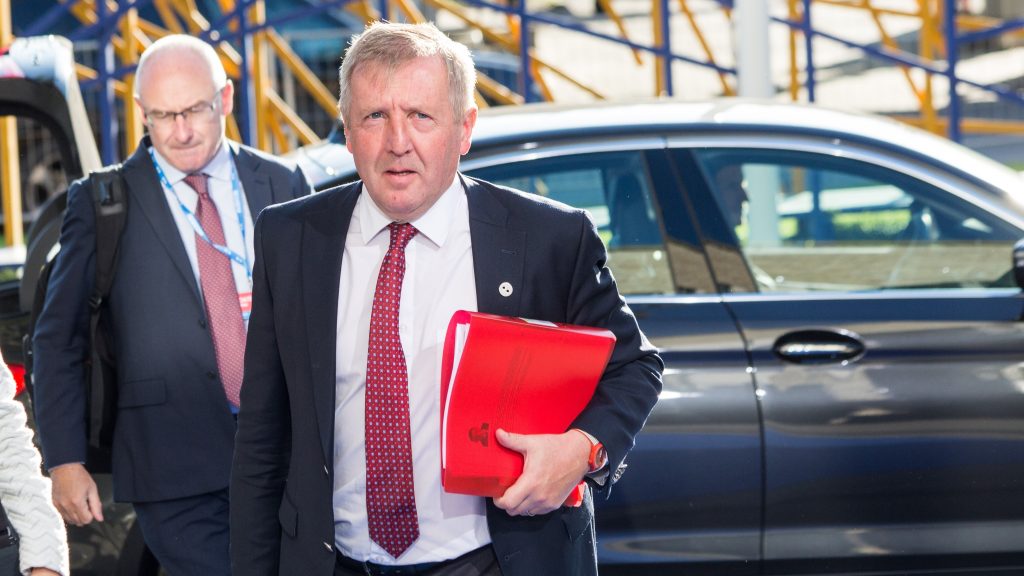Environmental activists call for end to overfishing

December 9th, 2019
Protesters gathered in Dublin today to demand that the Government ends overfishing in Irish waters ahead of key fisheries quota negotiations in Brussels next week.
Members of Extinction Rebellion Ireland and the Irish Wildlife Trust held a demonstration outside the gates of Dail this afternoon that recreated a fishing harbour with twelve-foot long commercial fishing nets and participants dressed as mermaids and fishermen.
The protest come one week ahead of negotiations of fisheries Ministers to set next year’s quotas for the Atlantic and North Sea, and also just weeks before a legally-binding EU deadline to end overfishing by 1 January 2020.
The requirement is a part of the European Council’s Common Fishery Policy (CFP) that was revised in 2013 under the Irish EU presidency. The policy included a law that would force member states to eliminate overfishing by the start of next year.
The target to end overfishing was initially set for 2015 and subsequently extended to 2020. The EU still remains off-course to meet it.
As an island nation, Padraic Fogarty of the Irish Wildlife Trust said this afternoon, Ireland should be “mortified” at its “deteriorating reputation for managing the seas around us”.
If the Minister for the Marine Michael Creed TD allows overfishing to continue into 2020, Mr Fogarty added, he will be “responsible for violating an agreement that Ireland itself brokered”.
A ‘deeply frustrating’ situation
According to the Marine Institute, under half of commercially exploited fish populations are hunted within limits which scientists consider to be sustainable, while the fishing of eight species are recommended to be stopped entirely, including herring and cod.
The depletion of fish not only impacts marine biodiversity, but it also impacts on Ireland’s under pressure seabird populations that rely on fish for food.
Ireland has previously been accused by the European Commission of “severe and significant weaknesses” in the control of fishing activity, with a lack of “effective” enforcement and penalties in place.
The current state of overfishing, according to the Environmental Pillar coalition, has been driven by poor decision making and “an obsession with short-term profits”.
“This is deeply frustrating as this situation was both foreseeable and preventable. The state of numerous stocks is so bad that the closure of entire fisheries must now be considered, something that would hit the fishing community hard,” Environmental Pillar spokesperson Fintan Kelly said.
The pressure to meet EU targets, Mr Kelly added, now rests firmly on the shoulders of Mr Creed as he heads to Brussels this week to negotiate the next round of fishing quotas.
BirdWatch Ireland’s analysis of Mr Creed’s position going into negotiations over the last three years shows he has routinely argued for stocks to be overfished.
This negative view of Ireland’s role in the negotiations is supported by the findings of a new report by the non-profit environmental law organisation ClientEarth. Their analysis of files held by the European Commission on fisheries negotiations in the last three years identifies Ireland as being among the top four Member States to regularly push for catch limits above scientific advice.
Ireland holds the worst record for the maximum number of such cases, ClientEarth found, pushing for 14 stocks – 50 per cent of the cases where Ireland holds a TAC share – to be set above scientific advice in 2017 alone.
ClientEarth also found that Ireland has the highest percentage of decisions where it successfully pushed for higher catch limits over the three years examined.

Overfishing and climate change
Similar pressure is building to end global overfishing as ocean experts are calling on international climate negotiations in Madrid (COP25) this week to end the practice in order to mitigate the impact of climate change on the world’s oceans.
According to executive director of Seas at Risk, Dr Monica Verbeek, a healthy ocean with abundant wildlife “is capable of slowing the rate of climate breakdown substantially”.
Ending overfishing, Dr Verbeek added, is a “quick, deliverable action” which can restore fish populations, improve the resiliency of ocean ecosystems, lower carbon dioxide pollution, increase global carbon capture, deliver more profitable fisheries and ensure thriving coastal communities.
[x_author title=”About the Author”]







